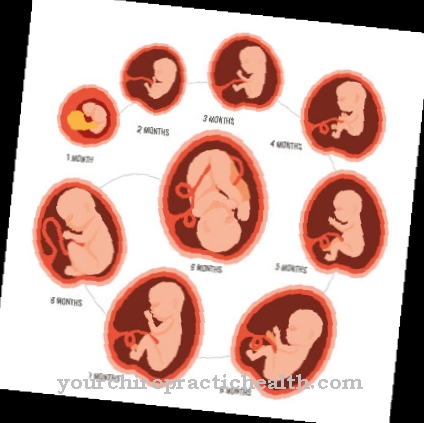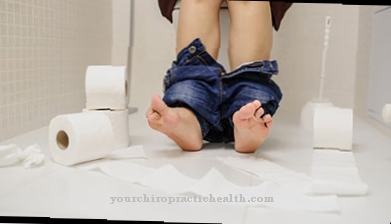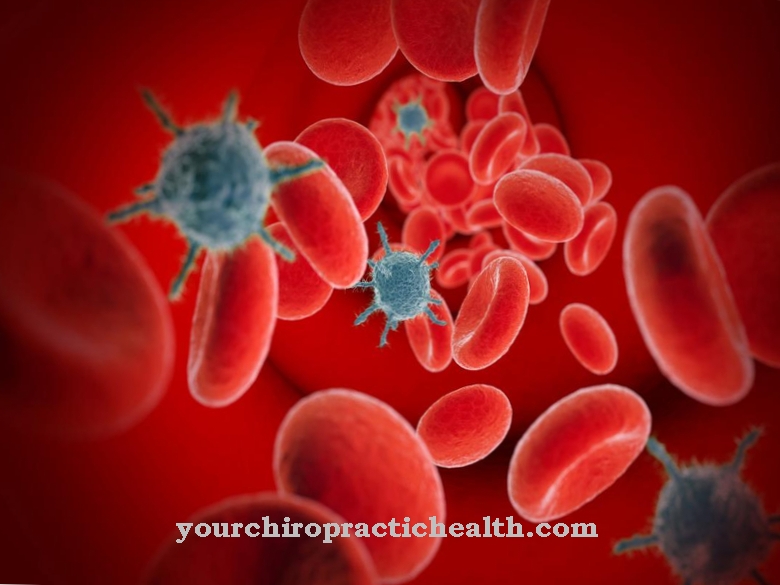Cystitis, urinary bladder infection or Cystitis are the various names for an infection or inflammation of the bladder or the urinary tract. Mostly women suffer from this disease. Typical signs of a bladder infection are pain and burning in the lower abdomen while urinating and a constant urge to urinate.
What is a cystitis?

Bladder infections (also: urinary bladder inflammation, cystitis) are usually recognized very quickly by those affected. Pain in the lower abdomen, a constant need to urinate, and painful urination are the typical symptoms of this condition. Usually the entire wall or mucous membrane of the urinary bladder is inflamed, which is the cause of the unbearable pain.
Cystitis is also known as catarrh or urinary tract infection among medical professionals. In the case of bladder infections, a distinction is made between acute ones that occur suddenly and chronic ones that keep recurring. During pregnancy, the risk of inflammation increases because urine flows more slowly through the urethra and it can no longer be adequately cleaned. Pregnant women should therefore also support their bladder during pregnancy with herbal remedies from the pharmacy. Thus you protect yourself against a cystitis.
causes
Bladder infections are usually caused by bacteria from the intestinal flora, but worms or viruses can also trigger the inflammation. These get into the urethra through smear infections or through feces. The bacteria migrate up there and infect the bladder.
Most women develop a bladder infection because the urethra is shorter than that of men and it is also closer to the anus. Especially during intercourse, many women get cystitis due to smear infections. Because of this, women are more likely to suffer from cystitis.
Symptoms, ailments & signs
A cystitis manifests itself through typical symptoms. These primarily include an increased need to urinate and a burning sensation when urinating. Urinary bladder inflammation is usually limited to the lower urinary tract.
With uncomplicated cystitis, complaints arise that are considered characteristic of the disease. These include the frequent need to urinate, burning pain when urinating and frequent draining of small amounts of urine. It is not uncommon for those affected to feel the feeling of pressing against resistance when using the toilet.
Because the bladder contracts spasmodically when you urinate, this causes pain. If only small amounts of urine are excreted when going to the toilet, although there is a strong urge to urinate, doctors call it pollakiuria. With a bladder infection, however, other symptoms are possible, such as hematuria (blood in the urine) or cloudy-looking and unpleasant smelling urine. The urge to urinate is particularly intense at night, which doctors call nocturia.
In some cases, the inflammation of the bladder spreads to other organs such as the kidneys or the prostate gland in the man. This is noticeable through other complaints such as pain in the back or on the flanks or fever. If women suffer from an inflamed bladder, it is not uncommon for them to experience intense discharge. This is especially the case when the inflammation spreads to the vagina.
course
Cystitis is diagnosed by a doctor using a urine test. If the urine is purulent, bloody or has an unpleasant smell, this is a clear sign of a bladder infection. During a microscopic examination, the doctor finds white blood cells, mucus, cell debris or bacteria in the urine if the result is positive.
If a cystitis is detected early, it heals completely in most cases within a few days. However, if diagnosed late, the bacteria can enter other organs through the ureter and damage them.
For example, if they affect the kidneys, this can lead to inflammation of the kidneys, which manifests itself as fever, chills and painful urination. If the infestation is particularly severe, kidney failure can even occur.
In addition, if left untreated, cystitis can develop into blood poisoning. If the inflammation recurs over and over, the bladder can be permanently damaged. Necrosis, the tissue, can die or harden. This causes the bladder to shrink and, in particularly severe cases, has to be surgically removed. Therefore, never underestimate a cystitis.
Complications
Cystitis can lead to complications, especially if left untreated. Lighter forms do not necessarily have to be treated with antibiotics, but it is strongly recommended if the symptoms worsen. Antibiotics kill the pathogens and prevent them from spreading through the ureter.
If this does not happen, the risk of chronic cystitis, which occurs repeatedly at relatively short intervals, and of other diseases increases. This can be inflammation of the kidneys or renal pelvis, the course of which is much more severe than simple cystitis. If no further action is taken, blood poisoning as a result of the renal pelvic inflammation is possible.
While the epididymis can also be attacked by the pathogens in men, cystitis is particularly critical for pregnant women, as it can lead to premature births and miscarriages. For this reason, pregnant women are regularly checked for this. However, even with antibiotic therapy it is possible that the above complications occur.
In the case of multiple cystitis in particular, the pathogens can develop resistance to the agent used. Therefore, the intake should not be longer than necessary. The antibiotics themselves can also cause side effects, as they also attack bacteria that are not harmful to humans. In addition, gastrointestinal complaints and allergies can occur.
When should you go to the doctor?
Cystitis is a disease that occurs particularly frequently in women and that often goes away without medical attention. However, there are a number of reasons that may make a doctor visit necessary.
This initially affects the duration of the complaints. Many of those affected manage to combat the symptoms effectively by drinking a sufficient amount of water, warmth (both on the stomach and around the feet) and, if necessary, home remedies such as taking products that contain a high proportion of cranberries. However, if the signs of cystitis have not disappeared after a few days, a medical check-up is advisable. This also applies in particular to patients who are pregnant or who are currently being treated for an unfulfilled desire to have children.
In addition to the persistence of the symptoms, there are a number of other symptoms that should be assessed by the doctor. These include blood in the urine, annoying itching in the genital area, severe pain in the abdomen and kidneys, and especially fever. Here a serious infection must be ruled out, which could possibly reach the kidneys via the urinary tract.
This can not only lead to severe pain, but also to other serious complications that require rapid therapeutic help. The earlier you visit a doctor, the faster the medical measures usually take effect.
Doctors & therapists in your area
Treatment & Therapy
An acute cystitis is usually treated with antibiotics, as the symptoms disappear quickly. The intake is usually between three to ten days.
Unfortunately, some pathogens causing bladder infections are now resistant to the active ingredient of the antibiotic, so that quinolones are also prescribed in special cases.
Antibiotics are also prescribed for chronic cystitis. However, this is taken over a period of four to six weeks, in some cases even longer. Painkillers are often prescribed for the discomfort when urinating. If you also want to accelerate the healing process yourself, make sure that you drink a lot. This flushes the bacteria out of your body more quickly and also cleans the urinary tract.
A hot water bottle or hip baths can also relax your lower body and thus relieve pain. Also make sure that you wrap your abdomen as warmly as possible. Bacteria find it difficult to multiply when heated, which leads to faster healing. It is best to see a doctor directly if you have a bladder infection.
↳ More information: Home remedies for cystitis
Outlook & forecast
Most bladder infections are harmless and heal well at the latest with the administration of antibiotics. This also applies to people who very often suffer from cystitis. Inflammations can usually be classified as harmless, especially if they are treated well and quickly. Nevertheless, the risk of developing a bladder infection increases with age, especially in women.
The prognosis regarding the occurrence of further cystitis due to some risk factors can worsen. These include, for example, a high amount of residual urine, the development of resistance from pathogens or a general susceptibility to infection. Accordingly, those affected are more often and more severely affected by bladder infections.
The only cases in which a bladder infection can become serious are the bacteria migrate to the kidneys and lack of treatment despite a long-term infection. The first case can develop into kidney and renal pelvic inflammation, which in the worst case leads to blood sepsis, which is life-threatening.
An inflammation involving the kidneys will nevertheless heal without consequences after professional treatment. Drinking plenty of fluids will help clear cystitis faster by draining the bacteria. Furthermore, home remedies (e.g. cranberry juice) have a positive effect on healing. The healing process can be accelerated accordingly.
Aftercare
Cystitis is a disease that often changes from an acute course to a chronic appearance. For this reason, consistent follow-up care is very important. This can also prevent the clinical picture from shifting from the bladder area up into the kidney area. Follow-up care can be carried out by the patient himself, also in conjunction with the family doctor or urologist, and is closely linked to behaviors that prevent the disease from flaring up again.
In this context, a sufficient amount of fluids is a particularly important criterion for efficient aftercare. Because cystitis is based on bacterial processes. If sufficient fluid is supplied to the urinary tract, such bacteria can be effectively flushed out so that they do not rise to the kidney area and also cannot multiply. It is also important that for this reason the patient does not push back urine, but instead goes to a toilet when the bladder is full.
There are a number of natural remedies that have proven to be very effective for cystitis and are therefore also valuable and side-effect-free helpers in the context of aftercare. This includes lingonberries and preparations with cranberries, which have proven to be powerful partners against acute and recurrent, i.e. recurrent cystitis. Warmth in the area of the feet and the lower trunk can also support aftercare for cystitis.
You can do that yourself
The most important thing is to drink a lot of fluids and to pass a lot of urine in the case of a bladder infection, as pathogens are flushed out in this way. You should drink at least two liters a day.
In the course of this, the environment in the bladder itself can be influenced in such a way that it prevents bacteria from growing. Despite the pain when urinating, the amount you drink should be strictly adhered to because concentrated urine irritates the bladder and urinary tract even more. Any prescribed antibiotic therapy must also be continued.
While sugar helps the bacteria to grow, lingonberry, cranberry and blueberry juice, thanks to the substance proanthocyanidin they contain, can make it more difficult for the pathogens to hold onto the bladder wall, which makes rinsing out even easier. In combination with special kidney and bladder teas, which contain diuretic substances based on plants, the bladder is cleaned.
Coffee, alcohol and citrus juices are not recommended as they further irritate the bladder and make it more susceptible to bacteria.
Hot water bottles on the lower abdomen or between the legs can help relieve the pain. Sitz baths also have a relaxing effect and can also make urination easier.
Sitting upright when using the toilet also ensures a better and more thoroughly emptied bladder.

.jpg)

























